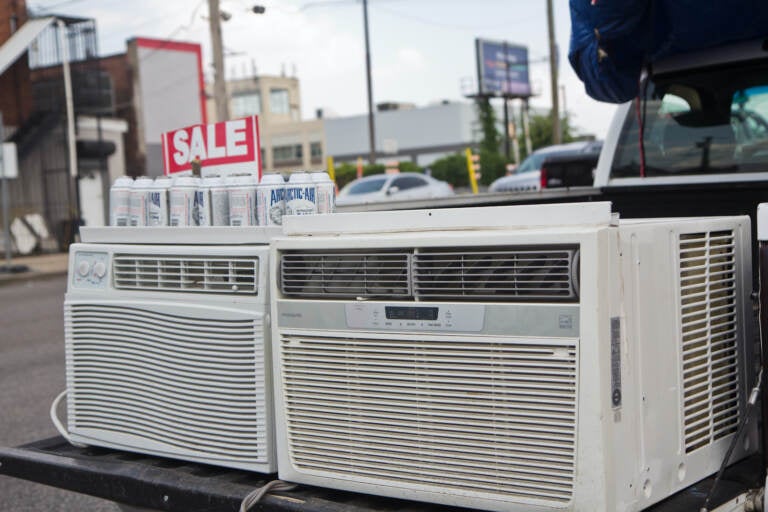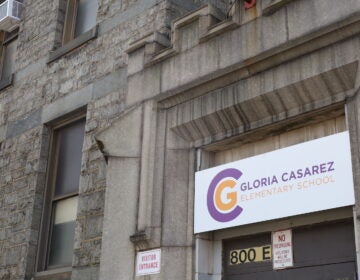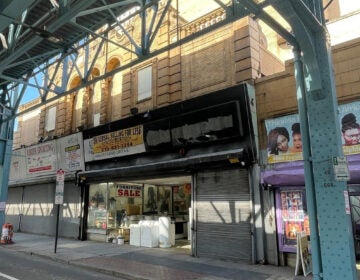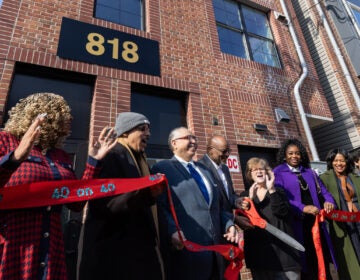Philly gets federal money to explore ‘cool roofs’
The U.S. Department of Energy grant will also help the city expand energy efficiency education and plan to grow the clean energy workforce.

AC units for sale on the back of a pick-up truck during a heatwave in Philadelphia on July 20, 2022. (Kimberly Paynter/WHYY)
Have a question about Philly’s neighborhoods or the systems that shape them? PlanPhilly reporters want to hear from you! Ask us a question or send us a story idea you think we should cover.
The city of Philadelphia is getting money from the federal government to help make homes and schools more energy efficient.
The city plans to use a $1.3 million grant from the U.S. Department of Energy to help expand education around home energy efficiency, make a plan to grow the clean energy workforce and support the School District of Philadelphia’s efforts to conserve energy in its buildings.
The city will also use the money to explore whether reflective roof coatings work to keep Philadelphians’ homes more comfortable during the summer and keep whole neighborhoods cooler.
“Many of our row homes, on the upstairs floor, it may be too hot,” Nidhi Krishen, deputy director for climate solutions in the city’s Office of Sustainability. “If we can reduce that temperature by a little bit, it makes that home much more livable.”
The “cool roof” pilot program is among the recommendations in a plan the city released in July to alleviate the burden of high energy bills for working class Philadelphians. According to the plan, Philly faces “some of the highest energy costs relative to residents’ income” compared to other U.S. cities, and renters, households of color and low-income households are disproportionately affected.
“When you have high energy costs, it has cascading effects on quality of life,” Krishen said.
The city will use the federal grant to develop recommendations for a long-term “Cool Roofs Program” and partner with the nonprofit Energy Coordinating Agency on the pilot, which will happen in a neighborhood identified as vulnerable to heat. One goal of the pilot program is to determine whether cool roofs can be deployed at “neighborhood-scale” to provide broader cooling benefits.
“Can it also help to reduce the urban heat island effect, so can it provide a cooling effect not only for that home but also for its neighbors and the community?” Krishen said.
The energy efficiency education efforts will also be done in partnership with the Energy Coordinating Agency, which manages a network of Neighborhood Energy Centers, one-stop shops for learning about and applying for utility and weatherization assistance programs.
The grant will support scaling up these education efforts in the city’s historically marginalized communities, where people spend a large portion of their income on energy bills. The Energy Coordinating Agency also plans to launch a mobile energy center that can travel to events and other places where people gather.
Sinceré Harris, chief deputy mayor for Intergovernmental Affairs, Sustainability, and Engagement, framed the projects as part of Mayor Cherelle Parker’s push to make Philly safer, cleaner and greener.
“These projects align with the mayor’s priorities, including tackling urban heat islands, supporting healthy, safe and thriving communities by improving housing, helping students excel at school and creating quality jobs,” Harris said in a written statement.
The projects funded by the Department of Energy grant must be completed within two years, Krishen said.

Subscribe to PlanPhilly
WHYY is your source for fact-based, in-depth journalism and information. As a nonprofit organization, we rely on financial support from readers like you. Please give today.








